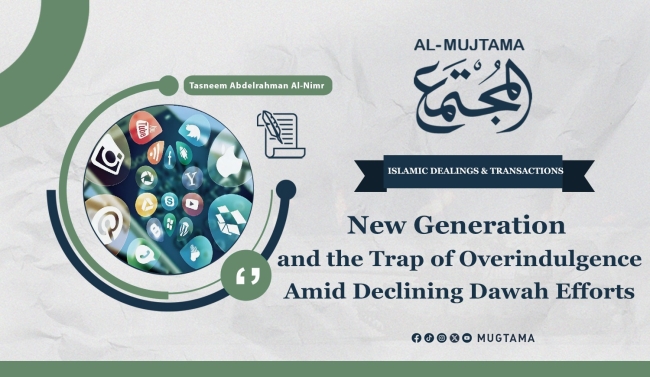New Generation and the Trap of Overindulgence Amid Declining Dawah Efforts
Today, we live in a world submerged in an ocean of temptations, where every day we are presented with countless forms and shapes of permissible pleasures. It is as if we were created to accumulate wealth to spend on indulgences! As if life has become a race where the winner is the one who owns the most possessions!
Life as a Commodity
Amid this consumerist lifestyle, the current generation faces a challenge distinct from those encountered by previous generations. Instead of seeking sustenance to fight off hunger or a drink to quench thirst, the focus has shifted to finding what looks better on Instagram or attracts more attention on Facebook!
The expansion in permissible pleasures is no longer just a means to a more comfortable life; it has become an end in itself. Advertising campaigns have trained the minds of youth to believe that happiness lies in the next product. Once acquired, it is placed on a shelf, replaced by something new, creating an endless list of false reasons for happiness and an unceasing pursuit of the next novelty. This is precisely what Gilles Lipovetsky discusses in his book “The Empire of Fashion,” where he examines how the perpetual desire for possessions is manufactured through marketing strategies designed to turn humans into mere consumers.
Permissibility in Islamic Sharia
Consumerism is just one manifestation of the expansion in permissible actions. Permissible acts, as defined by Imam al-Haramayn in his “al-Waraqaat,” are those for which the accountable person neither earns reward for performing nor incurs punishment for abstaining. The fundamental ruling for expanding in permissible actions is that it is allowed. However, this expansion may sometimes shift from permissibility to prohibition, which is not an unfamiliar concept in Islamic jurisprudence. For example, the five daily prayers, though individually obligatory, can become prohibited depending on the place where they are performed (e.g., praying in a usurped land) or the time (e.g., offering unrestricted voluntary prayers during the five disliked times).
Similarly, expanding in permissible pleasures can lead to excess, transitioning from permissibility to prohibition. For instance, someone who spends their money on extravagant food only to discard half of it is engaging in wastefulness. Although the Sharia permits spending wealth on what is lawful and pleasing, as Allah says, “O you who have believed, eat from the good things which We have provided for you and be grateful to Allah if it is [indeed] Him that you worship.” (Al-Baqarah: 172) At the same time, it prohibits extravagance and squandering of wealth.
Wastefulness is not limited to material forms, such as discarding food or money. It may also manifest in wasting time—spending countless hours aimlessly scrolling through social media to kill the time under the pretext of not committing a sin. Such individuals often forget—or are unaware—that their time is their most valuable capital. If they do not invest it in truth, they will waste it in falsehood. This falsehood may begin as permissible but can gradually lead down the path of futility, ultimately resulting in prohibited actions.
I mention the issue of consumerism to emphasize that the threat we face is not a minor one. Today’s youth are no longer required to merely resist their own desires but must also withstand temptations aggressively marketed to them with billions of dollars. These influences are no longer limited to their friends or immediate circles. Influencers now knock on their doors from every direction, whether with good or ill intentions.
Toward a Contemporary Da’wah Approach
- Speak Their Language: Those who advise or guide this generation must understand the challenges they face to be their allies rather than obstacles. They should recognize that the language of discourse has changed, and the circumstances have shifted.
- Do Not Underestimate Their Struggles: Preachers must not trivialize the magnitude of what today’s youth encounter. Social media, for instance, may not appeal to you because you lived most of your life without it. However, for someone born into a world deeply intertwined with it, how can they see life the way you do? It is beneficial to view the world through their eyes and walk alongside them rather than merely judging from above. Standing as a preacher in an ivory tower seldom resonates with those below.
It is crucial that mentors see those they guide as humans, not angels. As Imam al-Ghazali explains in “Ihya Ulum ad-Din,” humans have two sides to their nature: a clay side tied to desires and pleasures and a luminous side connected to the Creator of all beings. These two sides are in constant conflict as long as one lives. Thus, those tasked with da’wah must understand that the individuals they address are naturally inclined toward worldly desires, comfort, and ease. Not every soul is a beacon of light.
-------------------------------------------------------------


